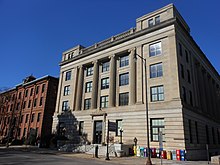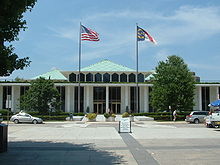Government of North Carolina
[1][2][3] North Carolina's executive branch is governed by Article III of the state constitution.The first North Carolina Constitution in 1776 called for a governor and a seven member Council of State elected by the legislature.[9][13][14] North Carolina's current judicial system was created in the 1960s after significant consolidation and reform.[18] The Administrative Office of the Courts oversees all clerical and financial aspects of the state judicial system.[20] The primary function of the tribunal is to decide questions of law that have arisen in the lower courts and before state administrative agencies,[21] and its docket is typically dominated by cases concerning interpretation of the constitution, major legal questions, and appeals of criminal cases involving capital punishment.The General Assembly's authority to create local governments comes from Article VII of the Constitution of North Carolina.[26] There are also special purpose governments, most of which concern either soil and water conservation or housing and community development.In addition to the manager, the commissioners usually hire the county's clerk, attorney, assessor, and tax collector.



Great Seal of North CarolinaPresidential SystemConstitution of North CarolinaLegislative branchGeneral AssemblyBicameralNorth Carolina State Legislative BuildingUpper houseSenateRachel HuntPresidentLower houseHouse of RepresentativesTim MooreSpeakerExecutive branchHead of stategovernmentGovernorJosh SteinElectionCabinetLieutenant GovernorState CapitolJudicial branchJudiciary of North CarolinaCourts of North CarolinaNorth Carolina Supreme CourtPaul Martin NewbyRaleighCouncil of StateNorth Carolina Council of StateNorth Carolina CabinetNorth CarolinaAttorney GeneralSecretary of StateCommissioner of AgricultureCommissioner of InsuranceCommissioner of LaborSuperintendent of Public InstructionState TreasurerState AuditorDepartment of AgricultureDepartment of AdministrationDepartment of CommerceDepartment of Natural and Cultural ResourcesDepartment of Environmental QualityDepartment of Health and Human ServicesDepartment of Information TechnologyDepartment of RevenueDepartment of Public SafetyDepartment of Military and Veterans AffairsDepartment of TransportationcodifiedNorth Carolina General AssemblyLaw of North Carolinastate legislatureNebraskaNorth Carolina House of RepresentativesNorth Carolina Senateex officiopresident pro temporesession lawsstate courtDistrict Court DivisionSuperior Court DivisionSupreme Court of North Carolinacapital punishmentNorth Carolina Court of Appealsappellate courttrial courtgeneral jurisdictionfelonyamount in controversyde novo reviewlimited jurisdictionoriginal jurisdictionfamily lawdivorcechild custodychild supportcivil claimsmisdemeanorsdelinquentMagistratestraffic violationswaiversworthless checkevictioncivil marriagesbench trialsAsheboro, North CarolinaList of municipalities in North CarolinaList of counties in North Carolinaspecial purposeregional councilsRegister of deedsClerk of courtBoard of EducationBoard of ElectionsDillon's rulemayor-council governmentscouncil-manager governmentcity managercity attorneyPolitics of North CarolinaList of governors of North CarolinaUniversity of North Carolina Kathrine R. Everett Law LibraryBrinkley, Martin H.TopicsClimateGeographyriversstate parkswildlifeHistorycolonial eraWar of 1812Civil WarnewspapersNorth CaroliniansPoliticsSymbolsAbortionCulturesports